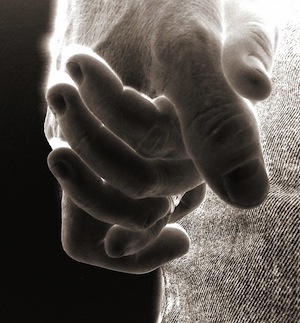The first time our two oldest sons, at ages 3 and 4.5, went for a walk without their parents, I learned something about love and trust. My wife and I had decided to let them walk a short distance up the hill from our house to a play area. They had insisted this was no big deal. Here was another thing they could do on their own without their mom and dad hovering nearby.
They had a wide sidewalk the whole way, but cars moved fast going up and down that hill. I was at least as nervous as they were and watched them as they started out with tentative steps. Then they turned to look at each other, reached out and joined hands.
That did it. They felt better, I felt better. Their nervousness, and mine, disappeared, and off they went. The touch of hand in hand brought trust, confidence, a sense of a bond that strengthened them. So simple, so human and yet, as I’m finding out now, so complicated and revealing of the web of messages and connections that hold two people together.
Confusing Affection and Threat
Partners in a troubled relationship know how hard it is to touch each other in such a direct way, to cut through the tension between needing reassurance and being afraid to ask for it, between showing emotion and holding it back.
When I was depressed, I could easily respond to my wife’s reaching out to touch my hand as if she posed a threat. I interpreted the gesture as an emotional demand that I could only respond to with fear. I would tense up and put my energy into resisting.
Fear could turn quickly to anger, as I sensed her trying to “invade” my emotional space at a moment when I wanted to focus within. I could be thinking: she should know this by now, but she doesn’t care about me. It’s all about her needs all the time.
Without my saying a word, the emotional cues could dance all over me – an averted glance, a closed hand, a tense body. These would set off her own reaction as she saw me pulling back. Her hurt and fear of losing me could shift to anger at the coldness of rejection.
She could well be thinking: he doesn’t care about me, he doesn’t even want to look at me. She could retaliate in her own way, provoking me with angry words, and so we would go more and more deeply into a sullen confrontation.
Emotions Are Social
Partners develop finely attuned nervous systems that give them a constant flow of emotional information to read, interpret and react to. What they see, hear and touch, perhaps the whole history of a tense relationship can flash through a few seconds at each encounter.
I always had screens of protection for filtering out and deflecting the feelings I wanted to avoid, even when I was afraid of losing the bond, even when I felt the need for connection more strongly than ever.
The mechanisms for emotional defense became the center of attention. All my energy went into keeping them in place. Most of the time, I couldn’t relax to be present to what was actually happening. When I could manage to settle down, the whole experience always turned out to be completely different. I could sense what she was feeling, why she needed the reassurance of simple touch and draw warmth from her responsiveness to me.
Defense Against Vulnerability
As Sue Johnson describes it, people often expect that strong emotion will provoke a catastrophe if they give in to it. The reaction is to clamp down. They feel exposed and deeply vulnerable, fearing that a powerful emotion will never go away.
They believe that the emotion will leave them feeling defective, disintegrating, drowning or dismissed. Johnson calls these expectations the 4 D’s and says that they cut across gender, class and culture.
It’s hard to turn these reactions around or to take a chance on finding out that they might have begun with the misreading of a single gesture. I suppose the logic of emotional defenses is that any possibility of danger should be interpreted as imminent disaster. No risk allowed. The “safe” thing is to shut down and fight back, even when there is no enemy.
The purpose of therapy, according to Johnson, is to bring about an emotional experience that moves you past the misread gesture to find the feelings that live below the surface. A therapist needs to reveal the pattern of interaction that begins with interpreting something seen, heard or touched and rapidly moves through many further feelings and reactions.
Changing the Meaning of Experience
She tries to tease out each emotional move the partners make toward each other, the cue that triggered it and the real needs each partner is trying to express. If a couple can see that an angry word or look of contempt can come from the same need for affection as a gesture like reaching out to hold a hand, then the cues take on completely different meanings.
The experience itself is transformed from a tense encounter to be approached as a threat to a welcoming reassurance of affection and trust. Partners can become more empathic with each other and better able to feel what they need and are trying to express.
Then it becomes possible for two people to relax with each other instead of focusing on the expectation of a powerful fear or anger. There really is a sense of seeing someone through new eyes when you drop the defensive reaction that has screened them off.
I never wanted to look directly at my wife when I was deeply depressed because my attention was dominated by strong feelings of emotional pain. When I could get around the depressive misreading of her attentiveness, it was almost like seeing her for the first time all over again.
Close Connections
Neuroscience and psychology are creating a new picture of the connections between two people. There is no arbitrary separation of reason and feeling and sensing. They are all connected through a mind that’s present in every neuronal nook of the body.
It’s complicated, but I keep thinking of the image of our two little boys instinctively reaching out to hold hands. A scary situation suddenly became safe. In that moment, they had the reassurance they needed to turn their attention toward play and away from danger.
It’s sad that we have to work so hard to get back to taking gestures of trust and love for what they are, instead of looking at them through the eyes of depression as potential threats.



Thank you.
Once again.
I can’t say how many times you have made things more clear for both my daugther (18) , and myself, in trying to understand my ex/her fathers depression. We both tried to help him, but he hurt us way too much, so now this dragon is his to slay, and we need to keep a safe distance, and he is 100% out of our lifes for now . Rigth now he himself acts like the dragon, and we need to keep us out of the flames and harms way. Your knowlegde and openness helps us si, so much. Thank you from Norways. ♥️
It’s a bit like u forget what it feels like. When ur in the depression u don’t touch anyone or feel much emotion if u do, not caring or feeling connected becomes normal, when it starts to lift ur feelings slowly switch on u start too want to hold their hand but don’t have the courage or confidence to do it. Takes a few mths and then u feel everything again.
John,
Sorry about that. Again this is about me. I have shut down physicially. Don’t touch me, Don’t hug me, leave alone and let me deal with this alone. It is a relief to read this and to know that I’m not alone. I was raped as a teen and the desire for affection just is not there. I can’t explain it to my husband. He assumes I’m just cold. But I’m not, really. I’m hurt. It brings tears to my eyes every time I read this. I guess just the relief I feel to know I’m not alone. This week has been rough. I will have to read it again under different circumstances. God bless you. If I could reach through the screen and hug you I would. Except I don’t share emotion. You have salvaged my day and turned it around. Now I’m not alone. Thank you so much for sharing and giving me hope and others like me hope.
Teresa
Hi, Teresa –
Have you ever had therapy to help with the long-term effect of the rape? A process called EMDR is especially effective with past events of this type. It can also work fairly quickly even with events long buried in personal history. There is a new book out by the psychologist who created the method, Dr. Francine Shapiro – Getting Past Your Past. It would be worth it to look into this. In general, I think it’s important to take care of your well-being, especially since living with a depressed partner is a risk factor for developing depression yourself. A therapist or counselor could be helpful in sorting through the difficult decisions you’re trying to make about your relationship. Your husband has to focus on dealing with his depression – that is not within your control. Things like phasing off medication should be a matter between him and his doctor – rather than become an issue you are drawn into. The issue for you is what are your limits about what you can live with if he refuses to treat depression to the point of remission.
John
Your descriptions here of trust and fear are great – holding hands says it all. I was also thinking that we can end up misreading people and jumping into defensive mode for other reasons than just depression. I think PTSD in its various degrees and forms can make us super-sensitive to very subtle gestures, tones of voice, etc., and we don’t even realize what’s being triggered. Of course, depression is very often a part of PTSD and now that I think about it, if you have PTSD and you’re being triggered all the time by things you aren’t even aware of, who WOULDN’T be depressed?? It’s like losing control of your life, always feeling at risk.
I do believe that couples therapy can be so helpful with this stuff. I know my husband and I had many “awakenings” when we’d finally get down to what was really going on with each of us and finding out that neither one of us hated the other and we really did want the same things. And it still continues to be work, I guess it never ends. We can’t always assume we know what the other is saying if we don’t ask.